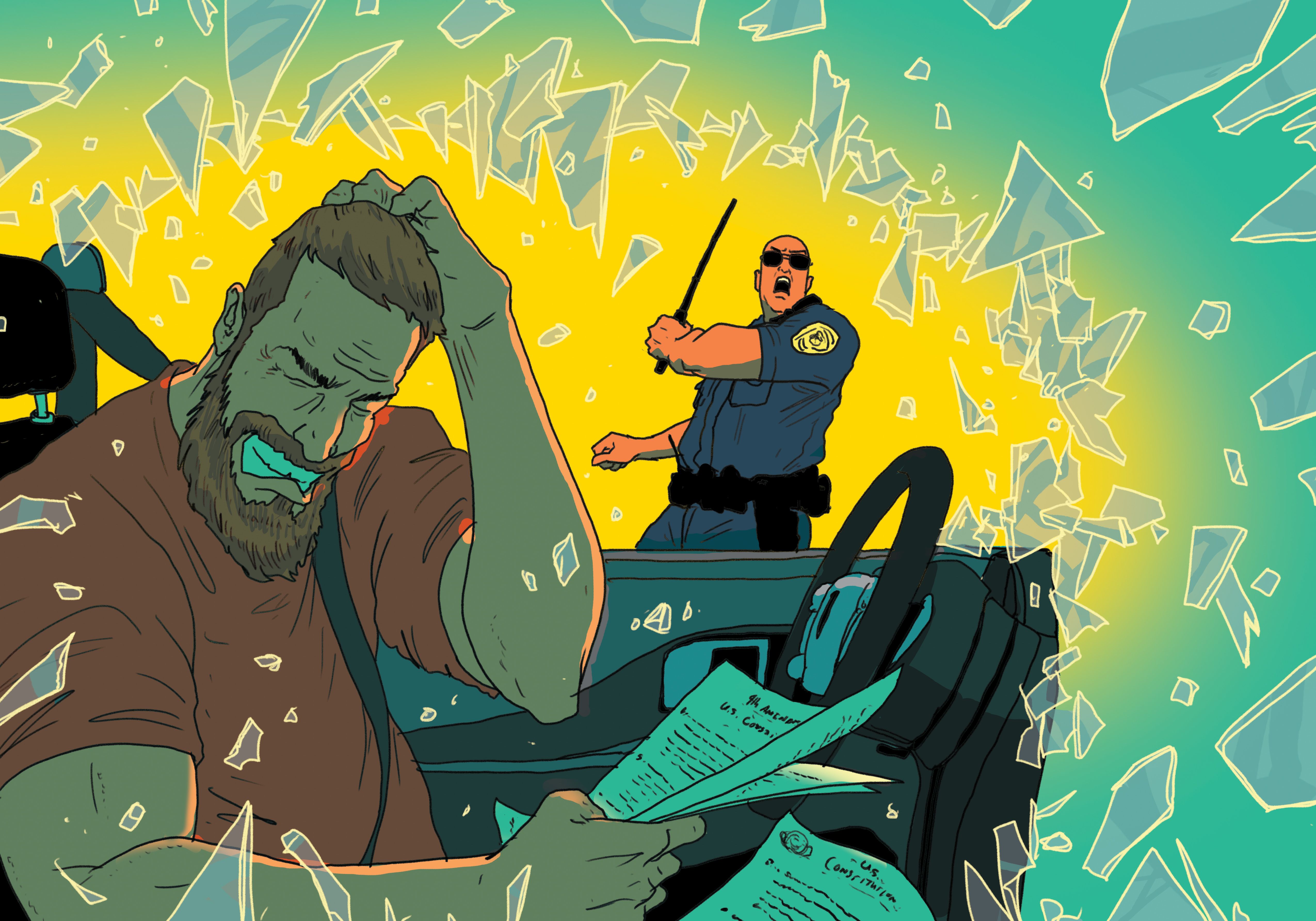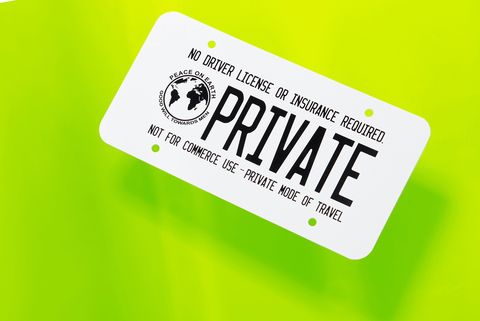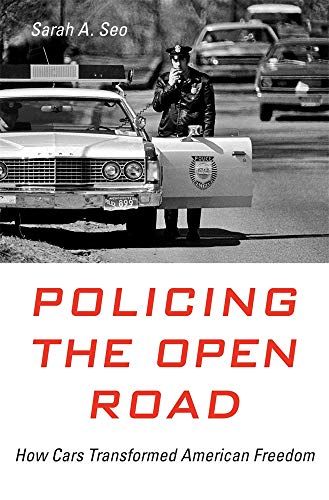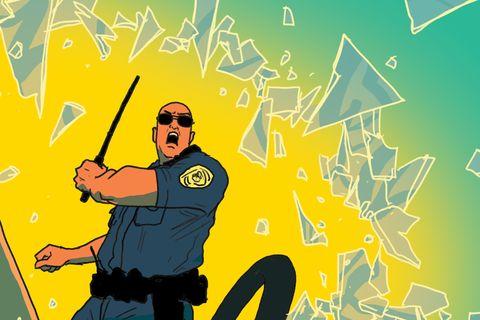Sovereign Citizens Take Their Anti-Government Philosophy to the Roads
‘Living people’: who are the sovereign citizens, or SovCits, and why do they believe they have immunity from the law?
Kaz Ross does not work for, consult, own shares in or receive funding from any company or organisation that would benefit from this article, and has disclosed no relevant affiliations beyond their academic appointment.
Partners
University of Tasmania provides funding as a member of The Conversation AU.
You might have seen articles or comments on social media lately alluding to “sovereign citizens”, or “SovCits” for short, with some reports suggesting COVID-19 government restrictions have driven a surge of interest in this movement.
So, who are these self-styled sovereign citizens, and what do they believe?
Sovereign citizens are concerned with the legal framework of society. They believe all people are born free with rights — but that these natural rights are being constrained by corporations (and they see governments as artificial corporations). They believe citizens are in an oppressive contract with the government.
SovCits reportedly believe that by declaring themselves “living people” or “natural people”, they can break this oppressive contract and avoid restrictions such as certain rates, taxes, and fines — or particular government rules on mandatory mask-wearing.
The SovCit movement arose in America decades ago, with roots in the American patriot movement, some religious communities, and tax protest groups. It has also been known as the “free-man” movement.
Re-interpreting the law
SovCits see themselves as sovereign and not bound by the laws of the country in which they physically live. Accepting a law or regulations means they have waived their rights as a sovereign and have accepted a contract with the government, according to SovCit belief.
The SovCit movement doesn’t have a single leader, central doctrine or centralised collection of documents. It is based on their reinterpretation of the law and there are many legal document templates on the internet for SovCit use to, for example, avoid paying fines or rates they see as unfair.
SovCits tend not to follow conventional legal argument. Some have engaged in repeated court action and even been declared vexatious litigants by the courts.
The SovCit movement has many local variations but there are some key commonalities across the Australian SovCit movement.
Key beliefs and phrases
A central belief, according to news reports, is that the Australian government, the police, and other government agencies are corporations. Believers feel they must be on guard to avoid entering into a contract with the corporation. They often do this by stating, “I do not consent” and trying to get the police officer or official to recognise them as a “living” or “natural” being and therefore as a sovereign.

It is a core belief of the movement that ‘sovereigns’ have the right to travel freely. LUKAS COCH/AAP
SovCits are often careful to avoid showing ID such as driver’s licences or giving their name and address. Saying “I understand” also risks being seen to agree to the contract so SovCits will repeat the phrase “I comprehend” to show they are refusing the contract.
Many reject their country’s constitution as false and reportedly refer to the Magna Carta of 1215 as the only true legal document constraining arbitrary power.
SovCits often come to the attention of authorities due to driving offences. It is a core belief of the movement that “sovereigns” have the right to travel freely without the need for a drivers licence, vehicle registration, or insurance.
Until COVID-19, the main threat seems to have been in committing road offences. More recently, actions protesting measures aimed at limiting the spread of COVID-19 have been linked to the sovereign citizen movement.
Sovereign Citizens Take Their Anti-Government Philosophy to the Roads
Sovereigns believe they don’t need driver’s licenses, license plates, vehicle registrations, or insurance to traverse the country’s highways.

On a sunny fall day in 2014, a civilian by the name of Gavin Seim initiated a traffic stop in Grant County, Washington. “You’re not allowed to have patrol cars that are unmarked,” Seim told deputy Dustin Canfield, who was indeed sitting in an unmarked white Dodge Charger. “Are you aware of that, under Washington State RCW?” Seim was polite but firm, righteous but ultimately magnanimous. “I’m not gonna write you up today,” he said to Canfield. The officer flashed a look as incredulous as amused.
The exchange played out like a roadside twist on Trading Places. Later Seim would post video of the incident to YouTube. It has earned 5.9 million views as of this writing. It’s kind of, sort of, somewhat, a bit legendary. Just a regular guy telling a police officer he’s not going to give him a ticket. That’ll get you noticed.
In recent years, many civilians have felt emboldened to question the police, their handling of situations, and their use of force. But however you feel toward law enforcement, it’s hard to deny that they have authority. That is, unless you have accepted sovereign citizen ideology. It’s kind of a movement. And kind of not.
It’s only notionally a movement in that there’s no hierarchy leading it, no set texts defining it, no formal goals for it to achieve, and nothing much holding it together other than a belief that the current government exists in betrayal of the Constitution.
Sovereign citizens, as defined by the FBI, are “anti-government extremists who believe that even though they physically reside in this country, they are separate or ‘sovereign’ from the United States.” As such, sovereigns object to (and often do not comply with) government authority, including law enforcement, courts, taxing entities, and motor vehicle departments. It’s only notionally a movement in that there’s no hierarchy leading it, no set texts defining it, no formal goals for it to achieve, and nothing much holding it together other than a belief that the current government exists in betrayal of the Constitution.
Laws to Abide By?
Though Seim rejects the sovereign label and asserts an ideological divide from it, he sympathizes with the cause, espousing anti-government views as a “liberty speaker.” His video is one of many recorded interactions between police and moralizing people attempting to take a stand against perceived government overreach. For most of us, if we know anything at all about the sovereign citizen movement, that knowledge doesn’t extend much beyond the videos of self-righteous provocateurs along the roadside spewing legalistic gobbledygook at exasperated traffic cops.

Policing the Open Road: How Cars Transformed American Freedom

Policing the Open Road: How Cars Transformed American Freedom
And that’s for good reason. According to Sarah Seo, an associate professor at the University of Iowa College of Law and the author of Policing the Open Road: How Cars Transformed American Freedom: “It’s not at all surprising that where sovereign citizens interact with the police is in their cars. Almost all citizens’ interactions with police take place in the context of cars.”
On the road, sovereign thought is expressed as the “right to travel.” In this, acolytes believe that people don’t need driver’s licenses, license plates, vehicle registrations, or insurance to traverse the country’s highways. To reach this conclusion, sovereigns often draw a distinction between being able “to drive,” which they say is the privilege of using a vehicle to conduct commercial activity, and being able “to travel,” which they assert is a right inherent in the Constitution.
The website FreedomFromGovernment.org offers a sovereign-friendly explanation of the asserted right to travel that runs some 30,000 words long, including citations. Multiple attempts to contact Trent Goodbaudy, a writer who apparently runs the site, were unsuccessful. But the online store linked to the site sells a set of replacement license-plate tags proclaiming that the vehicle is private, traveling without commercial purpose, and not subject to insurance or licensing requirements. They cost C/D$39.95. No one in the office has volunteered to mount them to their vehicle.

THE ORIGIN
“Where these allegedly binding definitions come from is a varied and often perplexing matter,” writes Caesar Kalinowski IV, a Seattle attorney who recently confronted sovereign legal claims in the Montana Law Review. “Sovereign Citizens often cite the U.S. Constitution, the [Uniform Commercial Code], the Magna Carta, the Articles of Confederation, and numerous other quasi-legal documents to support their assertions. Although authoritative sounding, the true basis for a citizen’s constitutional rights is found in the Constitution itself. The U.S. Supreme Court is the only legal body that can interpret and give legal effect to the Constitution. Accordingly, Sovereign Citizens’ citation to—and reliance on—dictionaries, state-court opinions, specific capitalization, or state records are misplaced and unavailing.”
Seim’s reprimand of deputy Canfield is a good example of this. Though he seems well informed, his interpretation of the law is misguided. After the video went live, Grant County sheriff Tom Jones took to Facebook to explain that even if the cruiser was in violation of the state law cited by Seim, there’s no ticket to write or arrest to make. That particular law requires such violations to be handled by an agency head. It’s administrative. Nothing more.
“Under common law, or so they believe, the sovereigns would be free men. Under admiralty law, they are slaves, and secret government forces have a vested interest in keeping them that way.”
“The internet has made it a lot easier for people to feel they’re getting authoritative information, when in fact it’s just some person sitting in their house espousing what they believe,” Kalinowski says. And the ideology sprouts from eccentric interpretations of the Constitution. It often includes religious elements seasoned with minutiae from ancient legal cases and broad appeals to individual freedom.
Sovereign citizens have several explanations of where America went wrong, but the basic thinking argues that, at some point, popular sovereignty was abandoned in favor of admiralty law—the law of the sea and international commerce. According to the Southern Poverty Law Center: “Under common law, or so they believe, the sovereigns would be free men. Under admiralty law, they are slaves, and secret government forces have a vested interest in keeping them that way.” And so sovereigns assert that when they are tried at a court flying an admiralty flag (i.e., an American flag with gold fringe), said court holds no jurisdiction over them and the case should be dropped.
Further, that “some point” where the U.S. forfeited its legitimacy is in dispute. Many sovereigns maintain it was with the ratification of the 13th and 14th Amendments. According to Kalinowski, “Sovereign Citizens believe that the Thirteenth Amendment, which outlawed slavery, caused problems for the federal government because up until that point, ‘slaves were not citizens of any state or country, because they were just property, and property did not have citizenship.’ To rectify this problem, according to Sovereign Citizens, the Fourteenth Amendment was ratified so as to create ‘a new class of citizenship.’ This new citizenship was a ‘privilege’ granted by the federal government, unsupported by the ‘sovereign inalienable right.’ “
A creative riff on history can attract followers, and because there is an entrepreneurial edge to sovereign culture, followers are also customers.
And that’s not the only theory. Others date it to the passage of the 16th Amendment, which allowed the institution of an income tax. Yet another sovereign theory pegs it at 1913, with the creation of the Federal Reserve. Or maybe it was in 1933, when the U.S. went off the gold standard. If this all sounds like free-form pseudoscholarship, that’s because it is. A creative riff on history can attract followers, and because there is an entrepreneurial edge to sovereign culture—sovereigns aren’t shy about selling anything or everything, whether it’s seminars, bumper stickers, books, or flat-out pleas for cash on YouTube—followers are also customers. And theories are changed and updated constantly.

THE PERIL
Whatever the origin, sovereign ideology has gained traction in the past decade, in part due to videos like Seim’s. That video is something of an oddity. The civilian flags down the officer, not the other way around, and everyone remains calm—no voices raised, no weapons drawn. Some roadside interactions with sovereign thinkers don’t proceed so peacefully.
In May 2010, police officer Bill Evans attempted a late-morning traffic stop of a ratty-looking Plymouth Voyager headed east on I-40 in West Memphis, Arkansas. After the minivan pulled off and parked, Evans’s backup, Sergeant Brandon Paudert, arrived. In the van sat Jerry Kane Jr., 45, and his 16-year-old son, Joseph.
Jerry Kane made his living holding debt-elimination seminars based on the sovereign idea that one’s “real self” is distinct from the “corporate self” established back when America sold its citizens’ futures under admiralty law. Judging by the old Plymouth he was driving—which was registered to the House of God’s Prayer in New Vienna, Ohio—his success with the seminars was modest.
A subsequent investigation revealed that Lacy had been diagnosed as bipolar and had downloaded a lot of sovereign literature.
Reinforcing each other’s paranoid view of the government, both Kanes were rapt by sovereign conspiracy theories. And as Evans attempted to frisk the elder Kane, the teenage Kane came out firing an automatic weapon. Evans and Paudert were murdered. A couple hours later, trapped in a Walmart parking lot, the Kanes were killed in a shootout with police.
In 2012, California Highway Patrol officer Kenyon Youngstrom was shot and killed while performing a traffic stop of a Jeep with an obstructed license plate belonging to Christopher Boone Lacy. Another CHP officer shot and killed Lacy. A subsequent investigation revealed that Lacy had been diagnosed as bipolar and had downloaded a lot of sovereign literature.

STOPPING POINT
As for Seim—who, remember, rejects the sovereign label—after theatrically contending for his ideas, being hauled into (and literally out of) court several times, he has opted out of America altogether. Believing the government he was trying to keep honest was out to get him and his family, he moved to Mexico. He says he’ll stay there, away from the fray.
“The reality,” Seim says, “is that the government is taking the term ‘sovereign’ and throwing it at anyone who doesn’t, when they see a cop, say, ‘Yes, sir. Thank you. Have a good day. Thank you for your service.’ That’s really what it amounts to.”
The homemade license plates and bumper stickers featuring sovereign slogans serve an unintended purpose. They give cops some warning about how the people in the vehicle they’re approaching might react to law enforcement.
Labels fade, and yet the ideas can persist, sold under new brands. There are fringe ideologies coming out of the cultural kiln all the time, and snake oil has always lubricated American culture. With the development of online subcultures, it’s easier than ever to find like-minded malcontents ready to support even the kookiest ideas. “Hopefully one day this will peter out, and people won’t be taken in by the snake oil anymore,” Kalinowski says.
The homemade license plates and bumper stickers featuring sovereign slogans serve an unintended purpose. They give cops some warning about how the people in the vehicle they’re approaching might react to law enforcement. Should these usual markers of sovereign citizenry fade, it will be that much more difficult to anticipate potentially violent interactions. That makes traffic stops even more treacherous for police and sovereigns alike.
The problem is, these people think they’ve figured out a way around that. But it’s actually causing them to have more interaction with the government.
“I understand that feeling of ‘the government’s encroaching,’ ” Kalinowski says. “[The idea that] the federal government doesn’t represent them, doesn’t understand them, and is trying to reach down into their lives in ways it shouldn’t be. The problem is, these people think they’ve figured out a way around that. But it’s actually causing them to have more interaction with the government. More negative interactions because they think they’ve found a talismanic phrase they can utter and get them out of all trouble. It never works out that way. There’s no case where a sovereign citizen’s case has been upheld.”
Anti-government ideology is on the edge now, mostly expressed as arguments on the internet. But it will continue to come out where sovereign citizens most often confront government power: in cars, on roads, during traffic stops.
This content is imported from OpenWeb. You may be able to find the same content in another format, or you may be able to find more information, at their web site.
Pseudolaw
Debunking sovereign citizens, freemen-on-the-land and other pseudo-legal theories.
Is there a right to travel without a driver’s license in the United States?

Right to Travel vs. Freedom of Movement
The phrase “right to travel” should be clarified because it’s commonly confused.
Many cases, documents, etc. using the phrase “right to travel” are in fact about Freedom of Movement, which is the Constitutional right to travel between States at will. If anyone speaks of a “Constitutional right to travel” Freedom of Movement is the only valid thing they could be referring to, as we’ll show.
In pseudo-legal circles, “right to travel” means the supposed right to “travel freely in your private property / automobile / conveyance on the public roads / highways without a driver’s license, insurance or registration and exempt from regulation or interruption provided one does not engage in commerce / earn profit or cause harm to people or property.”
Absolute freedom! Could it be true? How does the law work?
Tenth Amendment, State Codes
Traffic regulation isn’t mentioned in the Constitution, the supreme law of the land, therefore the power generally falls to the States pursuant to the 10th Amendment:
The powers not delegated to the United States by the Constitution, nor prohibited by it to the states, are reserved to the states respectively, or to the people.
States are free to enact whatever traffic regulations they want provided they do not violate federal law, as determined by the federal courts, pursuant to their police power.
All 50+ States, through their legislatures consisting of the people’s elected representatives, have seen fit to devise and enact their own traffic codes and police them.
Was it always this way?
There wasn’t always legislation displacing the common law. Automobile regulation began in the early 1900’s. Here is an excellent paper that thoroughly explores the transitional period when decisions could go either way: The Orphaned Right: The Right to Travel by Automobile, 1890-1950.
Bicycles were regulated decades before automobiles were invented and activists of the day faced many of the same questions and challenges modern right to travel proponents do. An analysis of that period can be found in this publication: The Impact of the Sport of Bicycle Riding on Safety Law.
Constitutionality
The States have all enacted traffic regulations, but do they violate federal law or the Constitution?
Judging constitutionality is ultimately up to the Supreme Court pursuant to Article 3:
The judicial power of the United States, shall be vested in one Supreme Court, and in such inferior courts as the Congress may from time to time ordain and establish.
Appeals are more-often-than-not declined by the Supreme Court so adjudication may stop at the federal United States Courts of Appeals (circuit courts) or District Courts and those are a good place to look for precedent, too. We prefer citations from these federal courts to avoid presumptions of bias that might arise by the State judging its own regulations and because federal decisions are superior to State decisions pursuant to the Supremacy Clause.
Federal Court Decisions
Let’s have a look at some federal cases on the right of States to regulate traffic.
The movement of motor vehicles over the highways is attended by constant and serious dangers to the public, and is also abnormally destructive to the ways themselves . . . In the absence of national legislation covering the subject a State may rightfully prescribe uniform regulations necessary for public safety and order in respect to the operation upon its highways of all motor vehicles — those moving in interstate commerce as well as others. And to this end it may require the registration of such vehicles and the licensing of their drivers . . . This is but an exercise of the police power uniformly recognized as belonging to the States and essential to the preservation of the health, safety and comfort of their citizens.
Motor vehicles are dangerous machines; and, even when skillfully and carefully operated, their use is attended by serious dangers to persons and property. In the public interest the State may make and enforce regulations reasonably calculated to promote care on the part of all, residents and non-residents alike, who use its highways.
The use of the public highways by motor vehicles, with its consequent dangers, renders the reasonableness and necessity of regulation apparent. The universal practice is to register ownership of automobiles and to license their drivers. Any appropriate means adopted by the states to insure competence and care on the part of its licensees and to protect others using the highway is consonant with due process.
There we have three solid federal Supreme Court decisions that set nationwide precedent that cannot be ignored. The Supreme Court is the final arbiter of law in the United States. Unless “right to travel” proponents can come up with a later Supreme Court ruling that states otherwise, their claims are busted.
And we have one less-impressive but telling quote from a lower federal district court:
Although a driver’s license is an important property right in this age of the automobile, it does not follow that the right to drive is fundamental in the constitutional sense.
A few of the above cases were found in a somewhat inflammatory and dated but comprehensive publication, Idiot Legal Arguments. We picked out the relevant federal cases, but many more high-level State cases can be found there, too, if you’re interested.
There actually isn’t a whole lot at the federal level because appeals beyond State courts are often denied as it has long been accepted by the federal government that traffic regulation is a proper exercise of State police power. Federal courts uphold the ability of States to regulate road traffic provided it is done so with equality, reasonableness and for public safety and doesn’t violate any federal laws or rights.
But I don’t “drive” or use a “motor vehicle”! Those are legal terms used to enslave me and I’m smarter than that!
I’m afraid the State and its courts dictate how things are viewed under its law. You don’t get to decide what’s considered driving or a motor vehicle, they do. You can’t simply switch out a few words to avoid responsibility. If you’re in territory controlled by the US and/or a State then its laws may be applied to you and you have no lawful recourse (see Law Basics).
I’ve heard of people being ignored or let go by police, even without a license or insurance!
Police have discretion. The world is a very dynamic place. There are any number of reasons why you might be passed by or allowed to proceed at any given time. The cop might be a scared rookie, not care, not want to fight, have a date, have to pee, be on lunch break, be at the end of their shift and going home – think about it – they’re human, not machines. The priorities of police and prosecuting attorneys vary. The law is what it is, though, and when you understand it you know in the long run you’re looking for trouble if you don’t obey it.
I don’t like traffic regulations. What can I do?
Your lawful remedy is to convince the majority of people in your State to put pressure on your elected representatives in the State legislature to change the law. That or you could move to another State or country where there are less regulations (and perhaps more fatalities).
Source https://theconversation.com/living-people-who-are-the-sovereign-citizens-or-sovcits-and-why-do-they-believe-they-have-immunity-from-the-law-143438
Source https://www.caranddriver.com/features/a30281693/sovereign-citizen-right-to-travel/
Source https://pseudolaw.com/right-to-travel-united-states